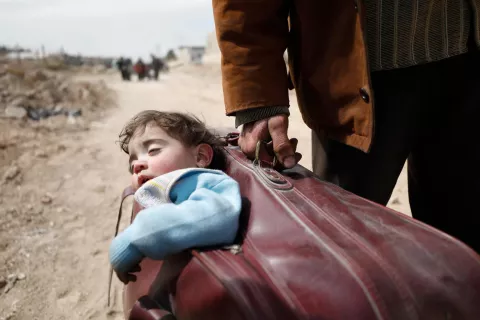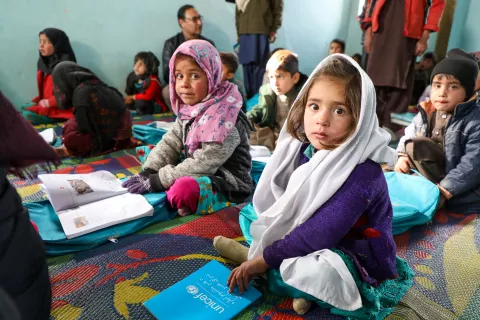The things we hold on to: Refugee children carry memories of home
No matter where they’re from or why they left, refugee and displaced children are children first.

What would you take if you had only hours – even minutes – to decide before being forced to flee your home? And what if you didn’t know how long you’d be gone, or what would be left of your home should you return?
These are questions that a growing number of refugees have had to confront as new waves of violence and protracted crises worldwide uproot millions from their homes. But even as the global refugee population has more than doubled in the past decade, refugee and displaced children – from Afghanistan to South Sudan to Syria to Ukraine – have something important in common: They all have equal rights. And they need our support to grow, to learn and to thrive in safety.

Zaina took a framed photograph of her late father when she fled Syria for the Za’atari refugee camp in Jordan. “I wanted to bring this with me when I came here. It was hanging on the wall. I saw my mother putting stuff together, so I ran to the photo and took it off the wall and put it in her bag,” Zaina says. “I have many memories of all the toys he gave me. I couldn’t bring those with me.”

Maksym fled eastern Ukraine with his mother and brother as the war escalated. “[We] had to flee because they were shelling,” Maksym says. He was supposed to play his first concert on the piano the week he left. His musical score was among the few precious things he was able to pack and take with him.

Ayoub packed a set of spoons when he fled Syria. “I wanted to take them with me as a memory, so I grabbed them as we were leaving the house and I carried them the whole way here,” says Ayoub, now in the Za’atari refugee camp in Jordan. “I used to eat my meals with them back at home, so I thought that I’m going to need them to eat when I come to the camp.”

Andaili holds up her family photo album, her most prized possession, which she brought from Venezuela to her new home in Colombia.

Nilufar is Afghan by descent but has never lived in Afghanistan. She was born a refugee in Pakistan before her family sought safety in Iran, Turkey, Greece, and then in Serbia.
“I don't have any more photographs, just this one,” she says, carefully unwrapping a framed photo of herself. “This is me wearing the religious headscarf I got from my school when I completed the third grade in Iran. All the children got the same headscarves back then.”

Yonas left his home in Eritrea due to instability in the country. He crossed Ethiopia, Sudan and Libya, hitching rides in cars and trucks. He was then evacuated by UNHCR (the UN Refugee Agency) to Niamey, Niger. He found a yellow hat while he was in Libya. “Since then, I keep it with me, even in Niger!” he says. “It protected me during cold nights. Now it has become special to me.”

Agnes holds her baby boy’s knitted hat in the Bidibidi refugee settlement, north-western Uganda. She fled South Sudan, in the midst of conflict, where the war and instability had created a severe food crisis. Her baby contracted malaria during the journey to Uganda. He passed away just days after their arrival at the settlement.

Fourteen-year-old Rohingya refugee Tasmin Akter holds her favourite book of poetry at a UNICEF-supported project in Kutupalong refugee camp, Cox’s Bazar District, Bangladesh. “When I take a decision for myself, like deciding to read a Bengali poem at home, I feel strong,” says Tasmin.

“I brought this dog,” says Shatha, 15, as she holds the small toy in her hands. She was 9 when she left Syria. “When we had to leave, I had so many toys to choose from, but he was my favourite.” She says she held him the whole way to the Za’atari camp. “I never let go of my dog so he could protect me. My toy dog will always be with me. I’ll tell my children my whole life story and his – because it’s the same as mine.”

Tatiana brought her dog with her to a temporary refugee centre in Moldova near the border with Ukraine. “I’m worried about my sister who’s hospitalized in Ukraine, and my brother,” Tatiana says. “I just want to go back home. I don’t want there to be a war.”
Reaching safety is just the start. Once out of harm’s way, refugee children and their families need opportunities to heal, learn and thrive. UNICEF stands in solidarity with all refugee children – because wherever they come from, whenever they’re forced to flee, all refugee children have equal rights. They all need our support. Read more about UNICEF’s work for migrant and displaced children and six actions that must be taken to achieve equal rights and opportunities for all refugee children.




